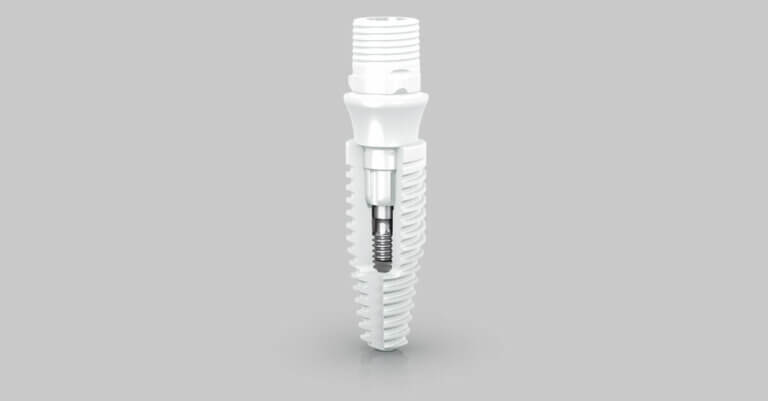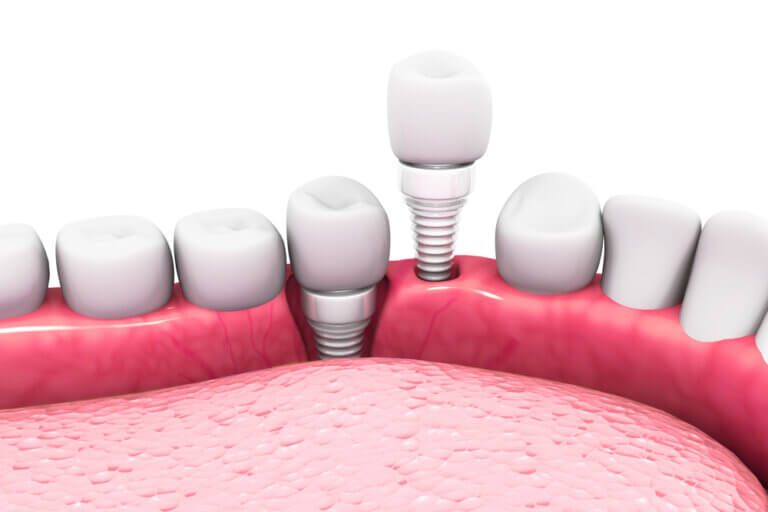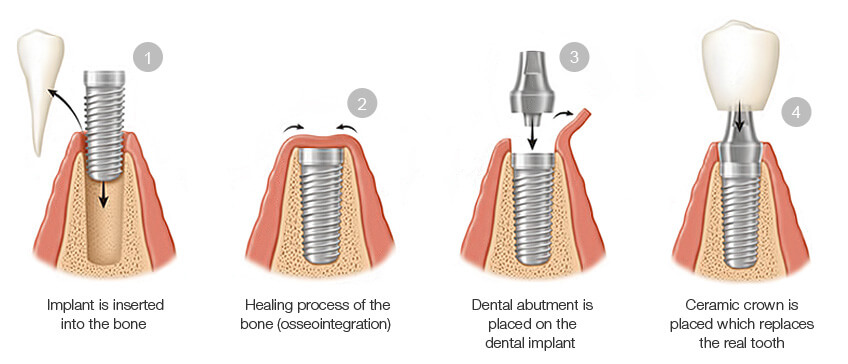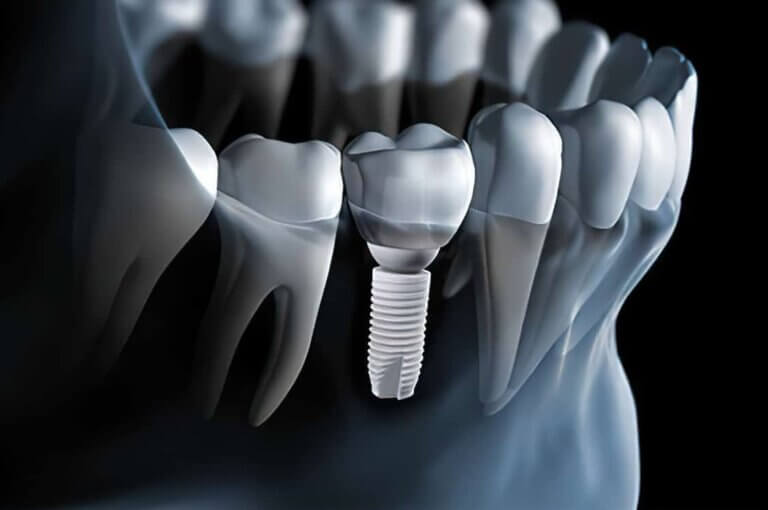Ceramic Dental Implants

What Are Ceramic Dental Implants?
Ceramic dental implants are a cutting-edge alternative to traditional titanium implants, offering a metal-free solution for replacing missing teeth. These implants are made from zirconium dioxide, a ceramic material known for its strength, biocompatibility, and aesthetic appeal. As the demand for metal-free dental solutions rises, ceramic implants have gained popularity for their natural look and excellent performance.
Before you deciding on whether ceramic implants are right for you, there are some things you should know:
- Who Needs Ceramic Dental Implants?
- Benefits Of Ceramic Dental Implants
- How Much Does Ceramic Dental Implants Cost?
- Steps In The Ceramic Dental Implants Procedure
- What Brand of Ceramic Dental Implants Do You Use?
- Frequently Asked Questions About Ceramic Dental Implants
If you have any further questions about ceramic dental implants or other dental services offered at Atlas Dental, please contact us.

Free phone consultation
Have questions about Ceramic dental implants? Schedule a free phone consultation with our Toronto dentist.

5 star google reviews
Our patients love us! See for yourself why people are choosing Atlas Dental in Toronto for Ceramic dental implants.

Ceramic dental implant Emergency Service
Are you having trouble with your Ceramic dental implants? Book an emergency appointment today.
Who Needs Ceramic Dental Implants?
Ceramic dental implants are suitable for a variety of patients, particularly those who prefer a metal-free option or have specific health and aesthetic concerns, including:
- Patients Allergic to Metals: Some individuals may have a rare allergy to titanium, making ceramic implants a safer alternative.
- Patients Concerned About Aesthetics: The white color of ceramic implants makes them less noticeable under thin gum tissue compared to titanium implants, which can create a grayish hue.
- Patients with Gum Recession: Ceramic implants reduce the visibility of the implant through receding gums.
- Patients with General Health Concerns: Ceramic implants may be recommended for patients with systemic conditions that make them sensitive to metals.
- Patients Seeking Metal-Free Solutions: Many individuals prefer avoiding metals in their dental treatments, making ceramic implants the perfect choice for a natural, biocompatible solution.
It is important to consult with your dentist at Atlas Dental to determine if ceramic dental implants are right for you

Benefits Of Ceramic Dental Implants
Ceramic dental implants offer several benefits that make them a preferred choice for many patients. These advantages include:
- Biocompatibility: Your body’s tissues recognize ceramic as a natural material, reducing the chances of inflammation or rejection.
- Durability: Ceramic implants are strong and resistant to chipping or fracture, offering long-lasting results with proper care.
- Aesthetic Appeal: Ceramic’s natural white color blends perfectly with surrounding teeth, creating a more natural smile.
- Corrosion-Resistant: Unlike titanium, ceramic does not corrode, making it more resistant to the damaging effects of acids and other substances in the mouth.
- Allergy-Free: Ideal for patients who are allergic or sensitive to metals, ceramic implants provide a safe alternative.
Ceramic dental implants offer a range of advantages over traditional titanium implants. Your dentist can help you decide if ceramic dental implants are the right choice for you based on your individual dental needs and medical history. Contact us for more information
Cost of Dental Implants
A cost of a basic Dental Implant can start from $4165, which includes the dental implant surgical placement, and the dental implant crown, plus any applicable material expense and dental lab fees. Zirconia (ceramic) dental implants cost slightly more. The codes relevant to dental implants in the Ontario Dental Association’s Suggested Fee Guide appear as follows:
Implants, Osseointegrated, Root Form, More than one component
- 79931 – Surgical Installation of Implant with Cover Screw – per implant: $1785+ Dental Materials Expense (approximately $350; for zirconia (ceramic) implants is approximately $450)
Crowns, Porcelain/Ceramic/Polymer Glass Fused to Metal
- 27215 – Crown, Porcelain/Ceramic/Polymer Glass Fused to Metal Base, Implant-Supported: $1280 + Dental Lab Fee + Dental Materials Expense (approximately $650-800)
Depending on your unique circumstance, implant surgery may be more expensive if any of the following is required:
- Tooth removal
- CBCT scanning
- Computer guided implant surgery
- Bone grafting
- Gum grafting
- Indirect sinus lifting
- Lateral window sinus lifting
Dental Implant services are usually considered a supplementary service by dental insurance plans and may or may not be covered by your dental insurance. Be sure to find out from your dental insurance plan provider how much you are eligible for before going ahead with dental treatment. Your dentist can help you submit an predetermination to your dental insurance.
For patients without dental insurance, Atlas Dental is pleased to offer dental financing through iFinance Dentalcard. Affordable payment plans start at 7.95% for terms of 6 months to 6 years. To learn more about Dentalcard dental treatment financing, follow this link.
Steps In The Ceramic Dental Implants Procedure
The process for getting ceramic dental implants involves several steps:
- Consultation & Examination: A thorough medical and dental history, x-rays, and possibly a 3D CBCT scan will be used to assess your bone health and plan the procedure.
- Surgery: The implant is placed in the jawbone under local anesthesia or sedation. Bone grafting may be required to support the implant.
- Healing & Osseointegration: The implant needs 3-6 months to fuse with the bone. In some cases, a temporary crown may be placed to maintain aesthetics.
- Final Crown Placement: Once healing is complete, the permanent implant crown is attached to the implant.
- Maintenance: Regular check-ups and cleanings are essential to maintain the health of your implant and surrounding tissues.
Talk with our dentist to find out if ceramic dental implants are the right choice for you based on your individual dental needs and medical history. Contact us for more information

What Brand of Ceramic Dental Implants Do You Use?
At Atlas Dental, we trust the Neodent® Zi Ceramic Implant System, known for its strength, aesthetics, and biocompatibility. Manufactured by Straumann, this system offers reliable, high-quality results for patients seeking metal-free implants.
If you have any questions about this system or would like to learn more about ceramic dental implants, please don’t hesitate to contact us.

Frequently Asked Questions About Ceramic Dental Implants
- Are ceramic dental implants as strong as titanium implants?
Yes, ceramic implants are designed to be strong and durable, comparable to titanium implants. However, they may be more prone to fracture in certain situations, so proper care is essential.
- How long do ceramic dental implants last?
With proper care and maintenance, ceramic dental implants can last 10-15 years or longer. Regular dental checkups and good oral hygiene are key to their longevity.
- Do ceramic dental implants look more natural than titanium implants?
Yes, ceramic implants are white, blending seamlessly with natural teeth and gums, making them a more aesthetically pleasing option for visible areas of the mouth.
- Are ceramic dental implants more expensive than titanium implants?
Ceramic dental implants are often slightly more expensive due to the material and specialized manufacturing process. Your dentist can provide a cost estimate during your consultation.

